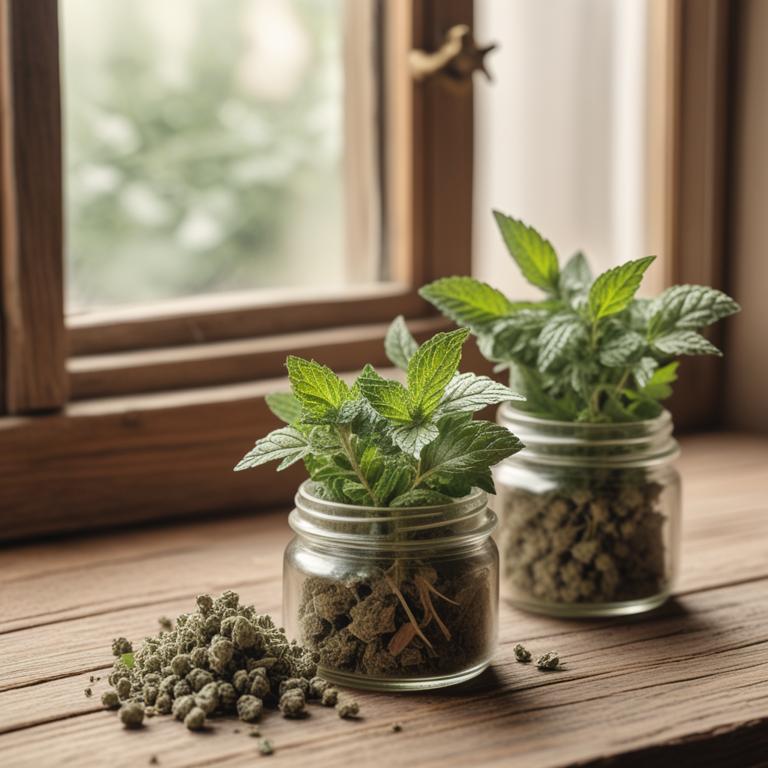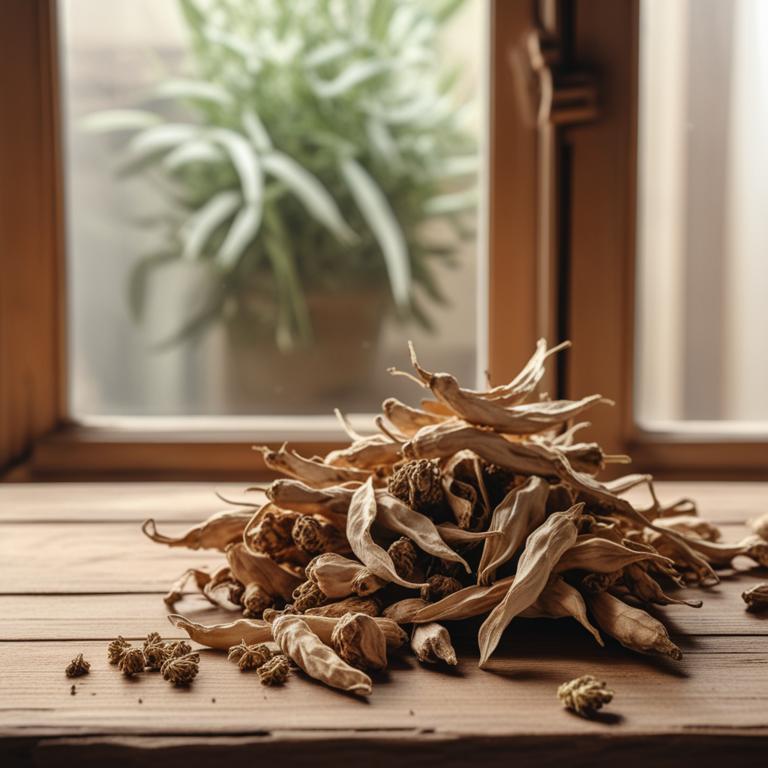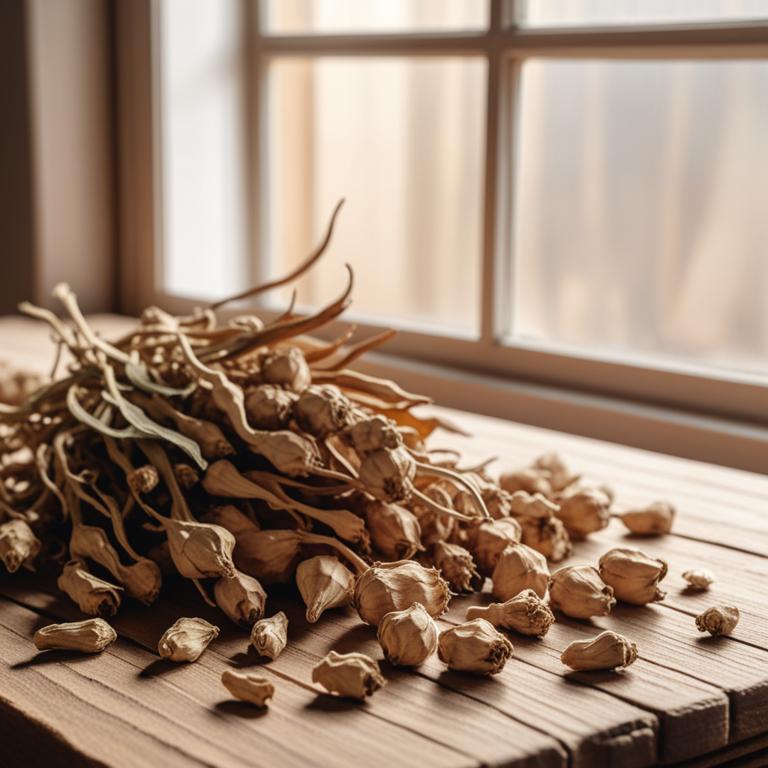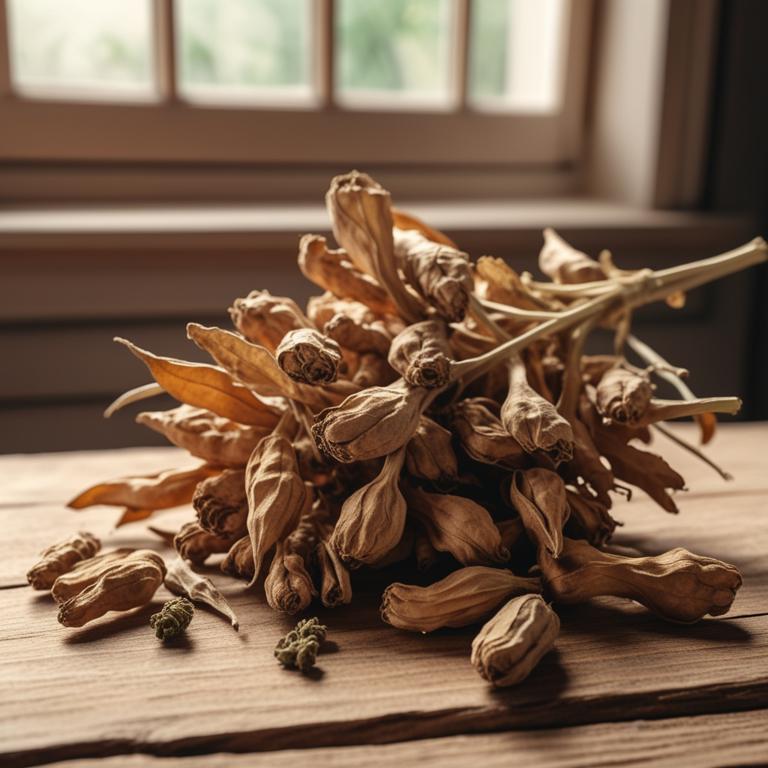Updated: Dec 1, 2024
Hyperacidity and the Power of Herbal Remedies
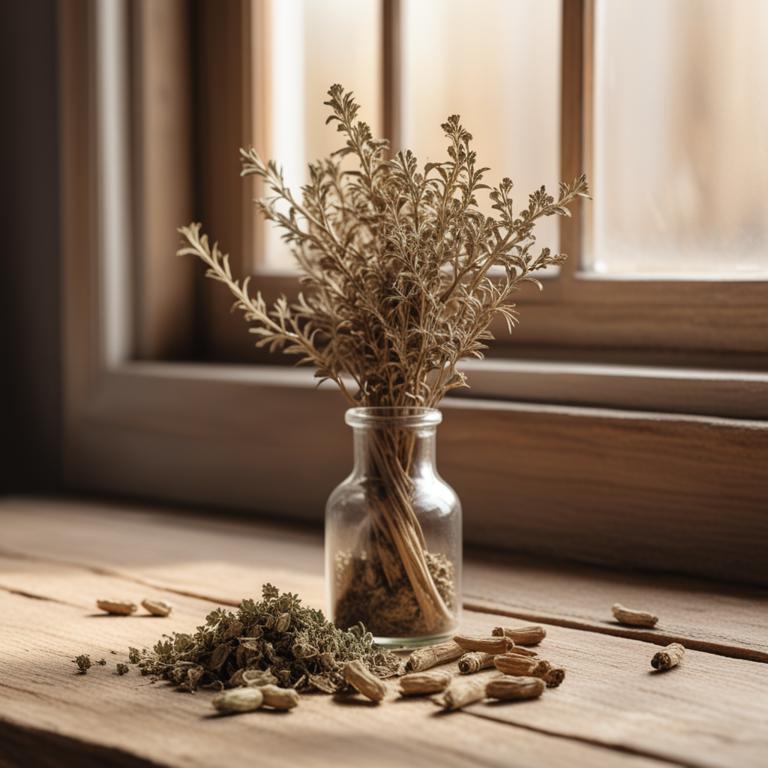
Hyperacidity is a condition where the stomach produces too much acid, leading to discomfort, heartburn, and difficulty digesting food.
It can make everyday activities like eating and sleeping a challenge. The causes of hyperacidity vary, but it's often linked to a poor diet, stress, and certain medications. When the body produces too much acid, it can cause inflammation in the digestive tract, which may lead to symptoms like bloating, nausea, and abdominal pain. To address hyperacidity, some natural remedies have proven effective. Herbs like Aloe Vera and Licorice Root have anti-inflammatory properties that can soothe the digestive tract and reduce acid production.
Turmeric, with its active compound curcumin, has potent anti-inflammatory and antioxidant properties that can help alleviate symptoms. Ginger, being a natural digestive aid, can also help calm the stomach and reduce inflammation. These herbs can be used in various forms to alleviate hyperacidity. For instance, drinking Aloe Vera juice or Turmeric tea can provide quick relief from symptoms. Licorice Root can be consumed as a tea or added to food for its medicinal properties. Ginger, on the other hand, can be made into a tea or added to meals for its digestive benefits.
By incorporating these herbs into your diet, you may find relief from the discomfort associated with hyperacidity.
Table of Contents
- What are the root causes of hyperacidity?
- What benefits can herbs bring to the management of hyperacidity?
- What are the principal medicinal herbs for reducing hyperacidity?
- What herbal preparations are most widely used to manage hyperacidity?
- Which herbs are not recommended for people with hyperacidity?
- FAQ
What are the root causes of hyperacidity?
The main causes of hyperacidity are related to the digestive system and lifestyle factors.
Gastroesophageal reflux, for example, occurs when the stomach acid flows back up into the esophagus, causing a burning sensation in the chest and throat. This can be due to a weakened lower esophageal sphincter, which is the muscle that separates the esophagus and stomach. Another cause is peptic ulcer, a sore in the lining of the stomach or duodenum (the first part of the small intestine), which can be caused by a bacterial infection, a long-term use of painkillers, or excessive acid production. The H. pylori infection is a common cause of peptic ulcers and can also contribute to hyperacidity.
This bacteria damages the stomach lining, allowing acid to leak through and cause irritation. Dyspepsia, or indigestion, can also lead to hyperacidity. This is usually caused by eating too quickly, eating too much, or eating spicy or fatty foods, which can put pressure on the stomach and cause acid to flow up into the esophagus. Caffeine intake can also trigger hyperacidity in some people, as it can stimulate the stomach to produce more acid.
Similarly, excessive alcohol consumption can lead to hyperacidity, as it can relax the lower esophageal sphincter and allow stomach acid to flow up into the esophagus.
What benefits can herbs bring to the management of hyperacidity?
Using herbs to manage hyperacidity can be very helpful.
One of the main benefits is that they can help reduce symptoms like heartburn and bloating. These herbs can also help neutralize stomach acid and reduce inflammation in the digestive tract.
This can make digestion easier and less uncomfortable. Some herbs can also help improve the balance of good bacteria in the gut, which is essential for a healthy digestive system. As a result, you may experience fewer episodes of acid reflux and other symptoms associated with hyperacidity.
These herbs can also help soothe and calm the digestive system, reducing irritation and discomfort.
What are the principal medicinal herbs for reducing hyperacidity?

Herbs can be a great help when it comes to dealing with hyperacidity.
One of the most effective herbs is Zingiber officinale, also known as ginger. It has a natural ability to calm the digestive system, reducing inflammation and soothing the stomach lining. This helps to neutralize the acid and prevent it from flowing back up into the esophagus. Fennel, or Foeniculum vulgare, is another herb that's great for reducing hyperacidity. Its seeds contain compounds that help to relax the muscles in the digestive tract, allowing food to move through more easily and reducing the risk of acid reflux. Fennel also has a natural antacid property, helping to neutralize the acid in the stomach. Black pepper, or Piper nigrum, may seem like an unlikely candidate to help with hyperacidity, but it actually has a number of benefits. Its active compound, piperine, helps to stimulate digestion and improve nutrient absorption, which can help to reduce the risk of acid reflux.
Additionally, black pepper has anti-inflammatory properties that can help to soothe the stomach lining. Turmeric, or Curcuma longa, is another herb that's been shown to be effective in reducing hyperacidity. Its active compound, curcumin, has powerful anti-inflammatory and antioxidant properties that can help to soothe the stomach lining and reduce inflammation. This can help to calm the digestive system and prevent acid reflux. Cinnamon, or Cinnamomum verum, is the final herb that's worth mentioning. It has a natural ability to warm the digestive system and stimulate digestion, which can help to reduce the risk of acid reflux. Cinnamon also has anti-inflammatory properties that can help to soothe the stomach lining and reduce inflammation. These herbs can be consumed in a variety of ways, including as teas, capsules, or added to food.
They can be a natural and effective way to reduce hyperacidity and improve overall digestive health.
What herbal preparations are most widely used to manage hyperacidity?

If you're dealing with hyperacidity, herbal preparations can be a great help.
A decoction is a good choice because it involves boiling herbs in water, which helps to break down their active ingredients and make them easily absorbed by the body. This process helps to neutralize stomach acid and provide relief from heartburn and indigestion. An infusion, on the other hand, is a gentle way to prepare herbs. It involves steeping herbs in hot water, which helps to release their juices and flavors. This method is especially good for sensitive stomachs, as it's easier on the digestive system. Infusions can also be made into teas, which are a soothing and comforting way to enjoy herbs. Tinctures are another popular form of herbal preparation. They're made by soaking herbs in a solvent like alcohol or glycerin, which helps to extract their active ingredients. Tinctures are highly concentrated and can be taken in small amounts, making them a convenient option for busy people.
They're also easy to digest, as the solvent helps to break down the herbs' active ingredients. Herbal capsules are a modern take on traditional herbal remedies. They involve placing dried herbs into capsules, which can be swallowed whole. This method is great for people who don't like taking herbs in liquid form, and it's also a convenient way to take herbs on-the-go. Capsules are also a good option for people who have trouble digesting certain herbs. Finally, herbal teas are a classic way to enjoy the benefits of herbs. They're made by steeping herbs in hot water, which helps to release their juices and flavors. Herbal teas can be enjoyed hot or cold, and they're a great way to relax and unwind. Many herbs, such as ginger and peppermint, are specifically designed to help with hyperacidity and can be enjoyed as teas. When choosing an herbal preparation, it's essential to select a method that suits your needs and preferences.
Some herbs may be more effective in one form than another, so it's worth doing some research to find the best option for you.
Additional Resources:
Which herbs are not recommended for people with hyperacidity?
If you have hyperacidity, it's a good idea to limit or avoid certain herbs that can make the problem worse.
Glycyrrhiza glabra, also known as licorice root, contains a compound called glycyrrhizin that can increase acidity in the body. This can make stomach pain and heartburn symptoms even more severe. Capsicum annuum, or cayenne pepper, is known for its spicy flavor, but it can also irritate the stomach lining, leading to inflammation and more acid production. Cassia auriculata, a type of flowering plant, has been used in traditional medicine for various purposes, but it's also known to stimulate digestion and increase stomach acid.
This can be problematic for people who already experience hyperacidity. Tribulus terrestris has been used to treat various health issues, but it's also believed to stimulate the digestive system, which may worsen hyperacidity in some individuals. Sassafras albidum, or sassafras, contains a compound called safrole that can also stimulate digestion and increase stomach acid, potentially exacerbating hyperacidity symptoms. These herbs may not be suitable for everyone, especially if they have hyperacidity issues.
It's always a good idea to consult with a healthcare professional before using any new herbs or supplements, especially if you have a pre-existing condition.
FAQ
Are there any specific herbs that can prevent hyperacidity?
Some herbs like ginger and licorice root have properties that may help reduce hyperacidity.
Ginger helps calm the stomach, while licorice root soothes inflammation. They can be consumed as tea or added to food.
These herbs have been used traditionally to alleviate symptoms of hyperacidity, but their effectiveness can vary from person to person.
Is it safe to use herbal remedies for hyperacidity during pregnancy?
During pregnancy, it's best to be cautious with herbal remedies.
Some herbs that help with hyperacidity can stimulate the uterus, which may not be safe for the baby.
However, certain herbs like ginger and licorice root are sometimes used in small amounts, but their safety and effectiveness are not well studied.
Are there any herbs that can reduce the frequency of hyperacidity?
Ginger and licorice root are herbs that may help reduce hyperacidity.
Ginger has natural anti-inflammatory properties that can ease digestion, while licorice root helps soothe the stomach lining. Some people find that drinking ginger tea or taking licorice root supplements can calm heartburn and reduce acid reflux episodes.
These herbs have been used for centuries to aid digestion.
Can i combine different herbal remedies for hyperacidity?
You can combine different herbal remedies for hyperacidity, but be careful.
Some herbs can interact with each other. For example, licorice root and aloe vera might both calm the stomach, but combining them could lower potassium levels.
Start with small amounts and see how your body reacts.
Related Articles

Mucus in Stomach: Understanding the Causes and Medicinal Herbs for Relief

Hemorrhoids Causes, Symptoms, and Natural Herbal Preparations

Understanding Gastroenteritis: Causes, Medicinal Herbs, and Herbal Preparations
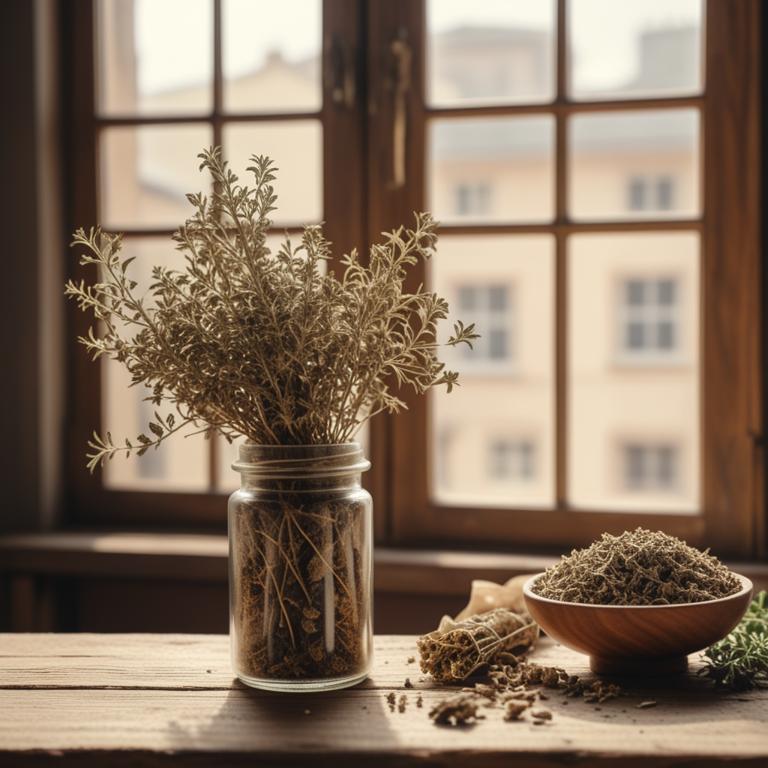
The Causes and Herbal Preparations of Stomach Discomfort
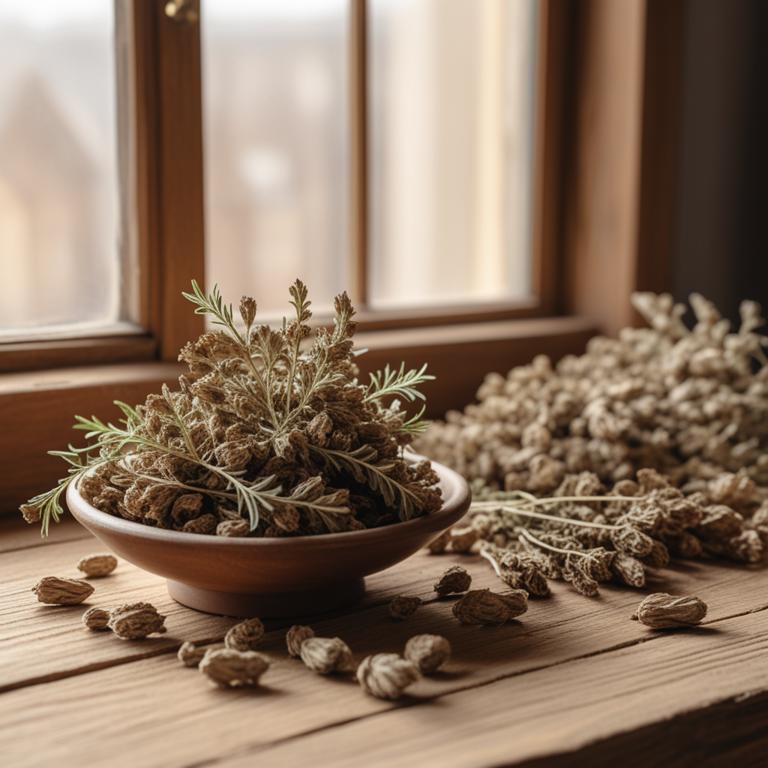
Diverticulitis Causes, Herbal Remedies, and Alternative Approaches to Healing
